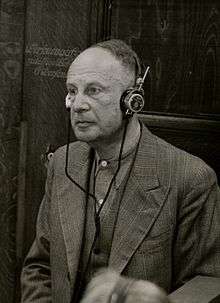Rudolf Lehmann (military judge)
Rudolf Lehmann (11 December 1890 – 26 July 1955) was a German jurist and military judge who was the Judge Advocate General of the Wehrmacht in World War II. Lehmann was a member of the Nazi Party[1] and was found guilty of war crimes at the High Command Trial at Nuremberg in 1948.
Rudolf Lehmann | |
|---|---|
 Rudolf Lehmann at the Nuremberg Trials, 1947 | |
| Born | 11 December 1890 Posen, Posen, Prussia, German Empire |
| Died | 26 July 1955 (aged 64) Bonn |
| Allegiance | |
| Service/ | Army |
| Years of service | 1914–18, 1938–45 |
| Rank | Generaloberstabsrichter |
| Commands held | Judge Advocate General of the German Armed Forces |
| Battles/wars | World War I World War II |
Career
His father was a professor of law. He grew up in Breslau and Hanau, studied law in Munich, Freiburg, Leipzig and Marburg and qualified as a lawyer before service as a reserve officer in the Imperial Army in World War I, during which he was awarded the Iron Cross. After the war he returned to Marburg University where he was awarded a doctorate in jurisprudence. He then entered government service as a prosecutor and worked at the Reich Justice Ministry.
He entered the Army Legal Service in October 1937 and from July 1938 to May 1945 was president of the Reich Military Court. In this role he assessed the charges against Generaloberst Werner von Fritsch between February and March 1938 and his judgement was for an acquittal. On 1 May 1944 he was given the unique rank of Generaloberststabsrichter (Colonel General Judicial Officer) which was equivalent to Generaloberst but outside the normal chain of command. He was taken into captivity in May 1945 and held in a US Army Prisoner of War Camp.
Nuremberg trials
He was found guilty of war crimes at the Nuremberg High Command Trial in October 1947 for involvement in drafting the Barbarossa decree and the Commissar Order that stipulated that any captured Soviet political commissar was to be executed, contrary to international law. He was sentenced to seven years imprisonment but was released from Landsberg prison 16 August 1950. He then lived in Bad Godesberg, where he was Managing Director of the mining trade association. He died in Bonn aged 64.[2][3]
References
- Kristina Brümmer-Pauly, Desertion im Recht des Nationalsozialismus, BWV Verlag, 2006, p. 77
- Rudolf Lehmann Biography. Retrieved 20 November 2012
- Rudolf Lehmann at Mazal.org. Retrieved 20 November 2012
External links
- US Military Tribunal Nuremberg (1948). "High Command Trial, Judgment of 27 October 1948" (PDF). Retrieved 30 May 2016.CS1 maint: ref=harv (link)